
For area residents like Jennie Rojo, a new state program to relieve hospital debt for patients is welcome. "Right now, I have a hospital bill for about $40,000 that goes back to 2016," Rojo, who lives in Newton, said. Rojo, 52, suffered a stroke in 2014.
She receives Medicaid and has private insurance, but she said many expenses from the hospital have not been covered. She also pays for some supplies that she said are not covered by Medicaid or her insurance. "With rent being the way it is and the price of groceries, I'm living check to check," Rojo said.

Rojo is not alone. Many North Carolinians owe hospitals billions of dollars. Hospitals know much of that debt will not be collected.
On Aug. 12, all 99 of the state's eligible hospitals agreed to participate in a program that will provide an enhanced level of payment to participating hospitals from the Centers for Medicare and Medicaid Services in exchange for relieving debt. Frye Regional Medical Center, Catawba Valley Medical Center, UNC Health Blue Ridge and UNC Health Caldwell are participating.
Specifics of the plan are still unknown. The state Department of Health and Human Services has provided an overview of the program. According to the department, the program will relieve hospital debt accrued since Jan.
1, 2014 for those who receive Medicaid benefits. For patients who do not receive Medicaid benefits, debt that is more than two years old will be relieved for those whose household income is less than or equal to 350% of the federal poverty level and have not made payments on their debt. Patients whose debt is more than 5% of the household income, have not made payments and have had the debt for more than two years will also receive relief.
The department said it may take up to two years for North Carolinians to begin to see relief for existing medical debt. Rojo said she has not made payments on her medical debt. The outstanding debt appears on her credit report and is a barrier to purchasing a home.
Rojo said the stroke and a tumor have recently left her unable to work. She previously worked as a general manager in restaurants. "I worked 38 years of my life," Rojo said.
"It's not my fault I'm physically and mentally unable to work now. I would give anything to go back to work today." According to information about the medical debt relief program on the North Carolina Department of Health and Human Services website, beginning July 1, 2025, debt will no longer negatively aff ect credit reports.
"That would take a huge burden off me and I wouldn't have to deal with the collection calls from the hospital," Rojo said. "They call at least two or three times a month." Hickory resident Brittany Huff man also has faced medical debt.
Huff man said a heart condition was discovered in 2020 that has required on-going medical care. She said she was once airlifted to a hospital and spent three weeks on a ventilator. "I have over $60,000 in hospital debt," Huff man said.
"That is ultimately aff ecting me from getting an apartment or vehicle I can get in my name." She said going to the cardiologist costs $300-$500 per visit. That takes most of her monthly paycheck.
"I don't even go anymore. I can't aff ord to go," Huff man said. "If my heart acts up, I just let it run its course.
I don't need any more bills racking up." Huff man, 28, said she does not make enough to cover her expenses and make payments to the hospital. Most of her debt is from visits to emergency rooms.
North Carolina Gov. Roy Cooper's office said in a press release that the state program could relieve up to $4 billion in medical debt for North Carolina residents. In the press release, Cooper said, "Unlike most other debts, medical debt is not a choice.
It is often a constant weight for low to middle income people that ruins their credit, keeps them from getting jobs, loans and credit cards, drives them into bankruptcy and discourages them from getting preventative health care they need." Catawba Valley Medical Center Director of Development Tracy Bolick said the hospital was forgiving debt before this state policy. She said during the fiscal year that ran from July 1, 2023 to June 30, 2024, the hospital forgave $211 million in debt for people whose household income was 300% or below the federal poverty level.
"We just thought it was the right thing to do," Bolick said. Bolick said the new program will help the hospital going forward as they will be able to work with people before they get deep in debt. One of the stipulations of the program is participating hospitals must apply discounts of 50-100% on patient bills based on income or participation in government programs for those whose household income is 300% or below the federal poverty level.
Those eligible for forgiveness under the new program from the state do not need to take any action right now. Participating hospitals will work with a third-party vendor to identify outstanding debt that is eligible for relief. According to NCDHHS's website about the program, debt relief is expected to begin in January for those on Medicaid.
By July 1, hospitals will have policies in place to prevent debt from negatively impacting a person's credit rating. Participating hospitals will also have policies in place to curb aggressive debt collection for low-income patients. In addition to the debt relief, Huff man is looking forward to a cleaner credit record.
If eligible for debt relief, Huffman said, "I could actually get into an apartment ...
I won't have to live in a hotel. I won't have to (be denied) every time I try to do anything that's credit based to better my life. I won't have to worry about, even if I pass away or something, my family won't have to worry about having all this medical debt to pay.
I don't want to leave my family with that debt." Billy Chapman is a reporter with the Hickory Daily Record. wchapman@hickoryrecord.
com "I don't even go anymore. I can't afford to go. If my heart acts up, I just let it run its course.
I don't need any more bills racking up." Brittany Huff man What else is included besides medical debt relief According to the North Carolina Department of Health and Human Services, participating hospitals will institute new policies for those that are at or below 300% of the federal poverty limit, including: Provide discounts of 50-100%, with the amount of the discount depending on the patient's income; Automatic discounts based on patient's income and participation in other government programs; Not selling medical debt for consumers; Capping interest rates on medical debt held by participating hospitals at 3%; and Committing to not reporting medical debt to credit agencies. What is 350% of the federal poverty level? The federal poverty level is a measure of income issued every year by the Department of Health and Human Services.
To qualify for the state plan to relieve hospital debt, patients who do not receive Medicaid benefits household income must be at or below 350% of the federal poverty level. For 2024, examples of household incomes that are at the threshold of the 350% level are below: 1 person: $52,710 2 people: $71,540 3 people: $90,370 4 people: $109,200 5 people: $128,030 Get local news delivered to your inbox!.










